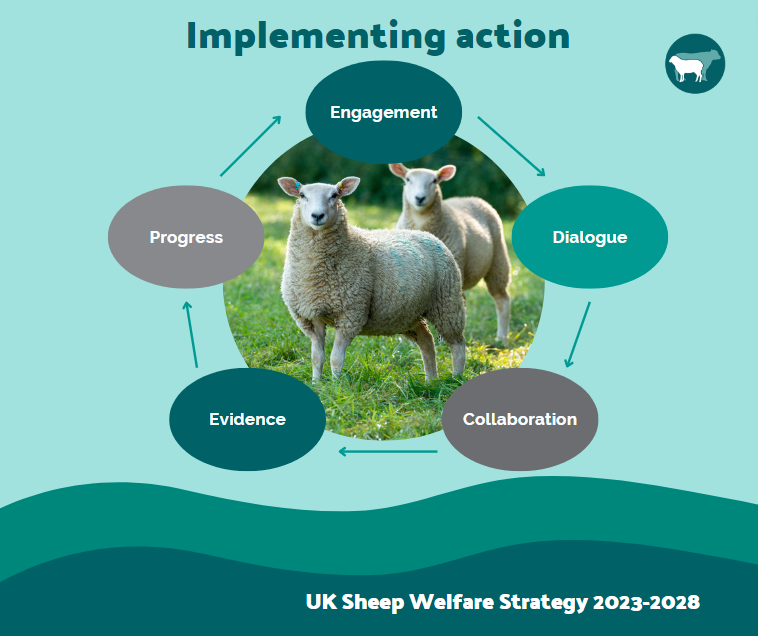New welfare strategy launched by the UK sheep industry

Farmers, vets, organisations and industry professionals from across the whole sheep industry have joined forces, through Ruminant Health & Welfare (RH&W), to launch the new UK Sheep Welfare Strategy for 2023-2028.
The strategy, which is the first of its kind for the sector, is designed to help the whole industry show progress in sheep welfare by 2028.
RH&W Chair, Gwyn Jones, says the strategy aims to deliver high welfare and encourage the adoption of good practice on all sheep farms across all four nations in the UK – regardless of size, location, or production system.
“The industry’s shared vision is for the UK sheep sector to demonstrate evidence-based progress in six key areas of sheep welfare over the next five years and beyond,” adds Mr Jones.
“Improvements to health and welfare will ultimately result in a more productive and sustainable supply chain, having a positive impact on the sector’s carbon footprint. At a grass roots farm level, it will benefit farmers directly through better productivity, working conditions and positive mental health.”
The six strategic goals in the strategy are:
- Healthy feet – reducing lameness for all sheep to improve overall health and welfare by increasing mobility, productivity, and longevity
- Appropriate body condition – ensuring optimal body condition score to improve resilience to disease and fertility, and a breeding female’s ability to rear thriving lambs
- Thriving lambs – ensuring lambs are born strong and thrive throughout life by providing good nutrition and protection against disease
- Collaborative flock management – ensuring active collaboration between farmers, vets, and advisers to aid the development of optimal flock health and welfare plans
- Positive welfare – ensuring all management decisions are made with a focus on welfare and considered through the eyes of the flock
- Sheep comfort – ensuring every farm has a proactive pain management plan to optimise the comfort of sheep and aid their ability to overcome disease, illness, and/or injury
Mr Jones says progress on these six areas is vitally important, as research shows the public expects the delivery of good welfare to include far more than ensuring good health alone.
“UK sheep farmers and the wider industry are in a good position to deliver on both,” he adds.
“The strategy will pave the way for this, however investment will be required for practical methods of reporting progress and the collation of existing data to show improvements.”
National Sheep Association chief executive and RH&W steering group member, Phil Stocker, says it is important for the reputation of the UK sheep sector to continue making progress where welfare is concerned.
He adds: “This strategy will provide great ammunition to drive forward the sector across a wide range of welfare improvements over the next five years including the licensing of analgesics, influencing Government support programmes, and conditions in transport and at slaughter.
“The strategy contains a five-step plan for delivery, which includes a commitment for routine meetings with a working group representing all stakeholders so we can agree an action plan for each of the six goals,” he adds.
“It will be challenging, but through RH&W we are determined to find ways to demonstrate and evidence the progress by produce an annual progress report for transparency.”
Mr Jones and Mr Stocker say that now the strategy has been launched, everyone in the sheep sector must work together to deliver its goals.
Mr Jones says: “The sheep industry has demonstrated ownership and responsibility by producing this strategy.”
“We have the endorsement of over 95 organisations and businesses who have signed up to support the strategy and we hope to see this backing empowering sheep farmers and producers to keep pushing forward with good welfare.”
The sheep welfare strategy is part of a wider body of work at RH&W to facilitate and create welfare strategies for the whole UK ruminant sector – a dairy cattle strategy was launched earlier this year and the beef cattle one will follow in due course.
-ends-
Issued on behalf of Ruminant Health & Welfare by: Meg Bright, Pinstone, 07747 452061.
Editor’s notes
Ruminant Health & Welfare was established to co-ordinate and focus the ruminant sector’s drive in tackling endemic cattle, sheep and goat diseases across the UK, working with partners in the four nations.
We work with industry and governments to influence collective action and secure the policy framework and funding required to prevent, manage or control disease and welfare challenges across the ruminant sectors.
Northern Ireland, Wales and Scotland already have protocols in place for many diseases, so Ruminant Health & Welfare’s role in these countries will be to assist existing bodies to deliver these priorities and share best practice.
Members comprise of key stakeholders as well as specialist expertise in ruminant disease, genetics and epidemiology. For more information visit www.ruminanthw.org.uk and sign up to our newsletter or follow us on Twitter @ruminanthw.
